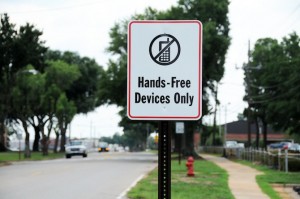Do Not Read This While Driving. In Fact, Don’t Even Think About It.
-
-
slice.mit.edu
- 2
Filed Under
Recommended

Lawmakers met in Washington earlier this month to debate guidelines that limit driver distractions and simplify electronic devices installed in vehicles, but new research at MIT suggests that drivers don’t need to text, Tweet, or program a GPS to potentially cause havoc on the road.
A group led by MIT AgeLab research scientist Bryan Reimer found that a driver's ability to focus on a surrounding environment varies depending on the “cognitive demand” of a non-driving activity. Essentially, if a driver’s mind is focused on a non-driving topic, be it an electronic device or an argument at home, the driver’s mind scans the surrounding area for potential hazards much less frequently.
Reimer told USA Today:The AgeLab research team studied 108 volunteers in ages ranging from 20 to 69 driving a midsize sport utility vehicle on Massachusetts’ Route 93 north. They were given three cognitive memory tasks of varying difficulty. The researched was published in Human Factors: The Journal of the Human Factors and Ergonomics Society in February.“In the past, the emphasis was on whether you're distracted or not distracted. This is too simple of a categorization. There are levels of cognitive demand, and those levels are statistically distinguishable. The level of thought going on has a relationship to how much a driver is aware of the driving environment.”
From Wired:Part of the Engineering Systems Division, MIT AgeLab works to transform technologies into practical solutions that improve how products are designed and services are delivered. In addition to the driving study, the AgeLab has created AGNES (a suit that approximates the motor, visual, flexibility, dexterity, and strength of a person in their mid-70s); AwareCar (a vehicle that monitors driver state); Miss Daisy (a driving simulator used for evaluating cognitive distraction and the effects of disease and medication); and Miss Rosie (a Volkswagen Beetle that evaluates a driver’s capacity for vehicle operation), among others.The AgeLab’s test car was fitted with sophisticated sensors that made it possible for researchers to analyze a driver’s cognitive load. Reimer envisions cars of the future equipped with similar technology that can instantly recognize when a driver is in over his or her head. If a car can sense that a driver is exhibiting “tunnel vision,” a car could cue the driver to end a hands-free phone call.








Comments
Paul Foster
Thu, 06/28/2012 12:02pm
Hi, For anyone reading I have experienced first hand the dangers of driving using a phone. My sister was trying to text whilst driving. Before we knew what happened she had drifted to the other side as a car came around the corner. There was no time to react and we hit head on. Luckily nobody was hurt too bad but it could have been much worse. Dont do it!
Wow
Wed, 06/20/2012 6:46am
This is serious problem nowadays. most people that use their phones while driving doesnt realize how dangerouse it is. Whats most important - they put in danger not only their lives, but other people! This month there was another accident near my city. Driver died, passenger admited he was using his Iphone to reply with SMS. He was 22 yers old...